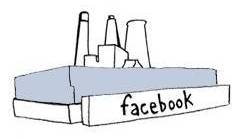Greenpeace Asks Facebook To ‘Unfriend’ Coal

Greenpeace’s director, and 500,000 Facebook users, ask the company to use clean energy
Greenpeace has intensified its campaign against Facebook’s use of coal-fired electricity, with a letter to Mark Zuckerberg, and a Facebook group that now has half-a-million members.
The head of the environmental campaign group has written directly to the boss of the social network giant, following news that Facebook plans to double the size of a data centre in Oregon which has been criticised for using coal-based electricity. At the same time, 500,000 people have signed up to ask Facebook to “unfriend coal“.
“Greenpeace regularly uses Facebook to engage its supporters and their friends to hold corporations accountable for their environmental impact,” wrote Greenpeace International Executive Director Kumi Naidoo in an open letter to the founder and chief executive of Facebook, Mark Zuckerberg. “Facebook is uniquely positioned to be a truly visible and influential leader to drive the deployment of clean energy.”
Facebook could be a leader
 The environmental campaign group has been criticising Facebook for months, as part of its “Cool IT” campaign to get data centre users and providers to reduce their energy usage. Facebook opened its first data centre (as opposed to outsourced IT), in Oregon, and signed a multi-year agreement for power with PacificCorp, a company that produces 67 percent of its energy from coal.
The environmental campaign group has been criticising Facebook for months, as part of its “Cool IT” campaign to get data centre users and providers to reduce their energy usage. Facebook opened its first data centre (as opposed to outsourced IT), in Oregon, and signed a multi-year agreement for power with PacificCorp, a company that produces 67 percent of its energy from coal.
“Facebook appears to be on a path that will make breaking our addiction to dirty coal-fired electricity even more difficult,” said Naidoo. “As you are aware, following Facebook’s announcement to build a new data centre in Prineville, OR., Greenpeace and over half a million Facebook users have expressed significant concerns with your decision to power this data centre with dirty coal-fired electricity from PacificCorp, which runs an electricity mix that is disproportionately powered by coal, the largest source of global warming pollution.”
In response, to Greenpeace’s original criticism, data centre experts pointed out that the electricity needs of Greenpeace’s own web servers, are mostly met through coal and nuclear powered electricity, although Greenpeace pointed out that it has only 2,000 employees, and much smaller traffic than that generated by Facebook’s 500 million users: “It’s a question of scale,” said Greenpeace spokesman Daniel Kessler.
Setting an example
Facebook’s size and visibility, as well as its role in the growing use of social networking, make its example a crucial one, said Naidoo: “No global business leader, particularly not one who reaches so many people daily, could deny that in this time it is both a threat to a company’s reputation and financial health risk to ignore their company’s environmental impacts.
Facebook has no public environmental policies, and does not disclose its carbon footprint, according to Naidoo’s letter, and is doing worse than Yahoo and Google, according to Kessler who praised the environmental credentials of Yahoo’s new data centre in Buffalo and Google’s investment in wind power.
At present, electricity from renewable sources is generally more expensive than coal-fired power, but this difference varies from place to place, and the Greenpeace letter asks Facebook to choose locations where sustainable energy is cheaper.
However, carbon pricing may be implemented in the US, in which case Facebook’s deal with PacificCorp could be an expensive mistake, since the coal-powered electricity would rapidly become more expensive. Naidoo called on Facebook to advocate energy pricing as a way to speed the move to reduce energy use.
“Half a million people is impressive advocacy,” said Kessler, in reference to the Greenpeace-backed Facebook group, arguing that avoiding potential unpopularity with users would make the move to environmentally-friendly electricity a good one for Facebook.
Other IT companies criticised by Greenpeace include Apple, whose iPad has been slated for driving unecessary It use.
Facebook was contacted, but made no response before this story went to press.